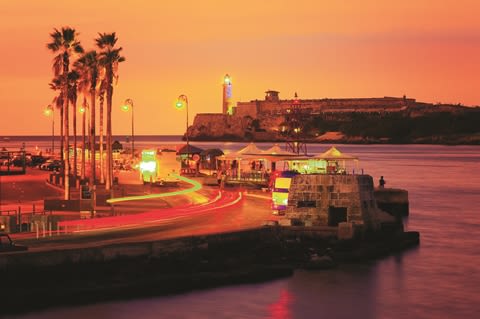Keeping Up with Cuba
Opportunities are building for a revitalized Cuban economy. By Johannes Werner

I've spent 15 years analyzing and reporting on the Cuban economy, and journalists and businesspeople from all over the world keep asking me if the reforms are working since Raúl Castro officially assumed the presidency in 2008.
Drop by drop, market reforms in Cuba have been percolating, but some of the positive effects evaporated immediately in the heat of a dysfunctional economic system. No wonder anti-Castristas in the United States keep yelling “Not fast enough!” and “They will fail!”
Until recently, my standard response to the skeptics was, “Just look at the streets of Havana.” Over the past three years, the face of the Cuban capital has changed, looking more like a typical Latin American metropolis. Hundreds of thousands of “self-employed” (the official euphemism for both formal small businesses and street vendors) are now hawking pizza, papayas, plumbing parts, pots and pans, and pirated DVDs from sidewalks, stairs, kitchen windows and front yards. Scores of new restaurants and bed-and-breakfasts are sprouting, adding life and color to Havana’s crumbling streetscape.
Nonetheless, after three years of reforms, GDP growth—the standard measure of success—has not kicked in; Cuban economic growth has been anemic. But government reformers have persisted, and the steady drip of trial-and-error reforms has turned into a little stream, with the first measurable effects beginning to pop up.
Cubans Are Vacationing
A fast-growing number of Cubans with disposable hard-currency income is renting rooms in the island’s luxury hotels and resorts. Cuban hotel guests have not only been compensating for a slight drop in foreign tourists this year, but they were the main factor in an occupancy increase from last year. Tourism ministry officials expect 625,000 Cubans to lodge in hotels on the island in 2013, 100,000 more than last year. That’s clearly less than the close to 3 million foreign tourists expected for 2013; but given that domestic tourism was practically zero just three years ago, this is quite a feat. By 2018, officials expect the number of national guests in luxury hotels to reach at least 2 million.
Free Trade Zone Established
Reform czar Marino Murillo told reporters in July that the next 18 months will be the make-or-break phase of the turnaround effort. Indeed, over the past two months, the pace of reform has accelerated, with one measure chasing the next. Many of them are about attracting foreign business.
On Sept. 25, Cuba’s foreign investment minister, Rodrigo Malmierca, was heading to a workshop in Beijing, pitching to hundreds of Chinese business executives what he called, “Cuba’s most complex project in 50 years.”
Malmierca was talking about the Mariel Special Zone, a 180-square-mile free-trade area that the government just created. In a show of just how diversified the Cuban economy is becoming, the Mariel Zone, inspired by the success of the Chinese and Vietnamese trade zones, is anchored by a Brazilian-funded and Singapore-operated billion-dollar container hub going up at the zone’s port.
The Cuban reformers want to stimulate foreign investment and domestic production by luring foreign manufacturers and service companies to the island. The island’s highly educated and motivated work force, combined with tax incentives and reduced red tape, they hope, will do the trick.
To be sure, the government does not let foreign investors get away with paying the rock-bottom salaries Cuban employees usually receive. (All foreign employers in the zone will have to contract with Cuban employees through a government agency that charges hard-currency fees, only a part of which will be passed on to employees.) Nor does the island have a history of manufacturing, so there are hurdles for any company considering setting up operations there. Worse, the U.S. embargo not only blacks out the world’s biggest consumer market next door, but makes the life of Cuban shippers and bankers miserable and unpredictable. The Obama Administration has made it clear that any U.S. dollar transaction involving a Cuban party anywhere in the world will be subject to confiscation, harsh penalties and restrictions on doing business in the United States.
Yet even before the government officially announced the Mariel Zone, at least two foreign companies, a Brazilian glass manufacturer and a Brazilian bus maker, are staking their claim on becoming the first to settle there. The level of interest is high in Brazil, and if attendance at the Beijing workshop is an indicator, a few Chinese companies may join soon.
Revitalizing Historic Havana’s Bayfront
The Mariel mega-project will trigger another mega— project involving foreign investors, the redevelopment of Old Havana’s bayfront. As the government plans to shift cargo ship operations from the Port of Havana to Mariel, Havana Bay will be completely rededicated to leisure and tourism. That, in turn, involves redevelopment of miles of docks, piers, wharves and warehouses along the Havana bayfront, amounting to possibly billions of dollars. The 500-year-old core of the charming city, which is being meticulously restored, already is the country’s largest tourist magnet; but the bayfront revival project has the potential to attract hundreds of thousands more. Save maybe Buenos Aires or Québec, there’s nothing like Havana's historic waterfront in the hemisphere.
Add to that the dozen-plus planned golf course and marina developments with luxury residences—for a total in the billions of dollars—whose approval has been pending for two full years now, and you may begin to understand the scope of the opportunity that’s evolving just a 45-minute direct flight out of Tampa International Airport.
“It’ll never work” may be your preferred take. But the momentum in Cuba is growing. And the faster it gets, the more expensive it will be to jump on the Cuban economy.

the Cuban economy and business.